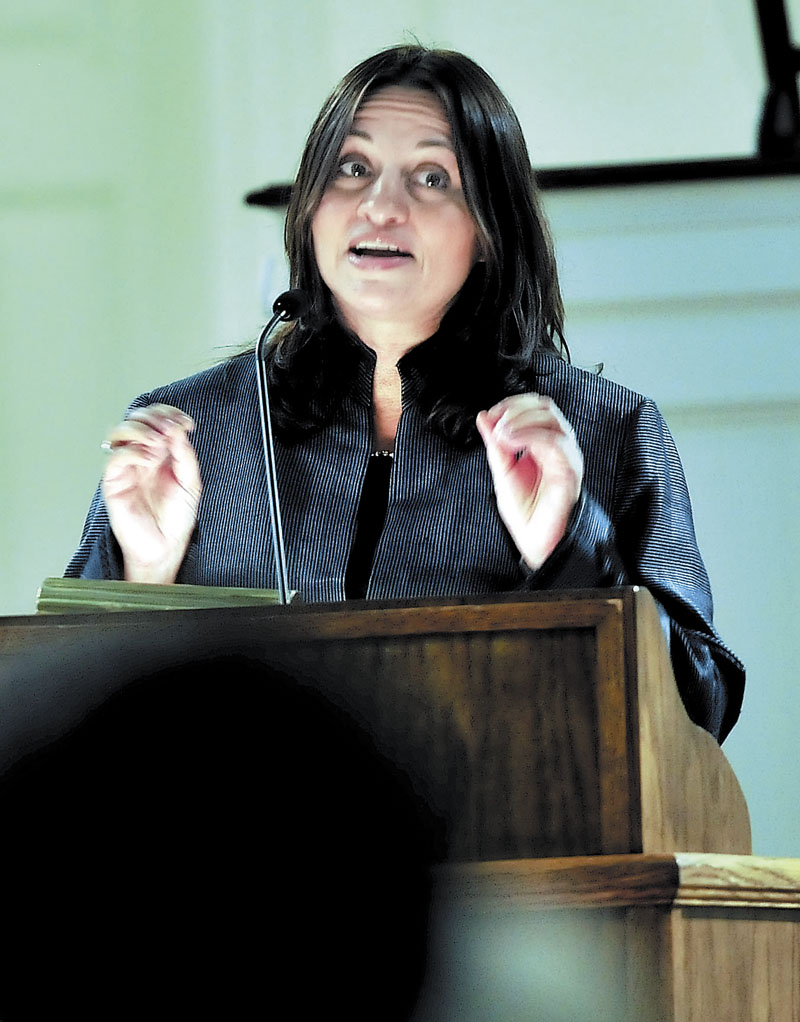WATERVILLE — Soraya Sarhaddi Nelson, a renowned foreign correspondent for NPR, was honored as the 59th recipient of the Elijah Parish Lovejoy Award from Colby College during a ceremony on Sunday night.
Given to recognize courageous journalism, the award has been bestowed annually in the memory of Colby graduate Elijah Parish Lovejoy, who was killed in 1837 for condemning slavery and is considered America’s first martyr to freedom of the press, according to the liberal arts college in Waterville.
President William D. Adams praised Nelson as an “undaunted chronicler of wars and revolutions” who lived up to the actions of Lovejoy before giving her the award and an honorary degree from the college.
Nelson, who is covering the Arab world for NPR, shared her experiences of reporting from dangerous locales around the globe with the audience packed into Colby’s Lorimer Chapel.
With many aspiring journalists from the college as well as other well-known members of the media in the crowd, she tried to define what being courageous actually means for journalists.
“Most of us try and emulate the journalistic tradition of commitment and courage that Elijah Parish Lovejoy set the standard for. But in many places, the dangers of doing so are as great now as they were during his time,” she said.
She told stories of being blinded by teargas while reporting on the recent Arab Spring uprising and pleading with black-clad gunmen to let her free in Iraq in 2004.
“Extreme danger inevitably leads to soul-searching about why we do what we do and whether it’s even worth it,” she said, after reading off names of colleagues who have died during the 11 years she has worked in war zones.
Still, Nelson told the journalists in the crowd that it is the people she meets while reporting who are the real brave ones, referring to the Arab women who knowingly risk their lives to fight for equality from repressive regimes.
“The travails I’ve faced in conflict zones seem trivial when compared to the hardships of the people I’ve had the privilege to report on. They’ve allowed me to record their most raw moments and feelings, often in places where “foreigner” is synonymous with “enemy,” she said.
When asked by an audience member about how the Arab world perceives the U.S., Nelson described a conflicted population that is unsure of the country’s intentions.
“America is seen as bringing money on one hand but strife on the other,” she said.
Another question asked Nelson to compare the Occupy Wall Street protests in the U.S. to those in the Arab world. She responded that she has been too busy to follow the American movement closely but views it as addressing very different circumstances. Arab nations have far worse political climate facing them than the Americans, who have a government that has far better voting practices, she said.
“Americans at this point are not angry enough to pour out into the streets,” she said.
During her speech, Nelson answered her own question about the soul-searching done by journalists.
“I became a foreign correspondent because I wanted to connect Americans to the rest of the world through compelling storytelling,” she said.
“Looking back at what I’ve faced in places like the Gaza Strip and the West Bank, Iraq, Afghanistan and Libya, I feel it’s been worth it, both for myself and those informed by my work,” Nelson said.
David Robinson — 861-9287
drobinson@centralmaine.com
Copy the Story LinkSend questions/comments to the editors.



Success. Please wait for the page to reload. If the page does not reload within 5 seconds, please refresh the page.
Enter your email and password to access comments.
Hi, to comment on stories you must . This profile is in addition to your subscription and website login.
Already have a commenting profile? .
Invalid username/password.
Please check your email to confirm and complete your registration.
Only subscribers are eligible to post comments. Please subscribe or login first for digital access. Here’s why.
Use the form below to reset your password. When you've submitted your account email, we will send an email with a reset code.